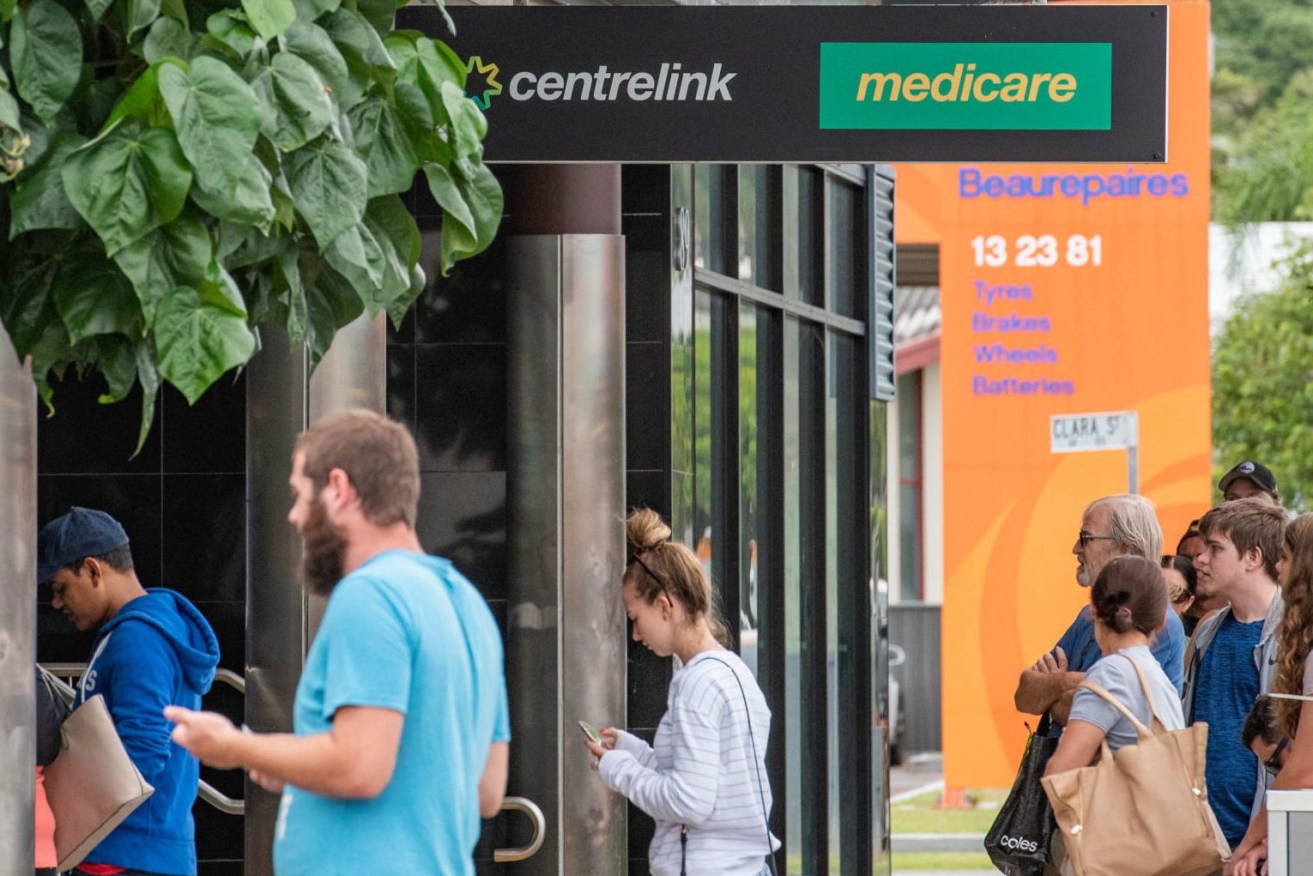Centrelink on high alert – jobless rate set to soar towards 10 per cent
Jobless fears as Queensland Government directs $28 million into community mental health, drug and alcohol support services to avoid social disaster.

Australians queue at Centrelink during the COVID-19 pandemic. (Photo by Florent Rols / SOPA Images/Sipa USA)
With the number of COVID-19 cases set to surpass 1,000 in Queensland, health restrictions are being kept in place and will continue to challenge the state’s economy and social fabric. One in 10 people may soon find themselves unemployed and reliant on Centrelink – if they are eligible for revamped welfare payments.
Queensland Health Minister Steven Miles today said making additional funds available to non-government organisations to help support the community was crucial to promoting well-being and resilience.
“We know that the impact of this virus, and the measures that we have to put in place to prevent its spread, won’t just be physical, they will be mental and emotional too,” Miles said.
The funding package came after consultation with peak industry bodies including the Queensland Alliance for Mental Health, Queensland Network of Alcohol and other Drug Agencies, and the Queensland Aboriginal and Islander Health Council.
Queensland Mental Health Commissioner Ivan Frkovic welcomed the funding, saying more people were facing greater challenges as a result of the pandemic and economic crisis.
“When it comes to mental health, we are all on a spectrum of vulnerability,” Frkovic said today.
“Whether we were well before this, whether we were vulnerable at the time, or whether we were living with mental illness, the level of vulnerability has now spread to all of us.”
QCOSS CEO Aimee McVeigh today said that even when the worst of the outbreak had passed, “we are still facing changes that are going to be very challenging and will result and community and social upheaval unless they are very carefully managed”.
McVeigh has called for support packages to be kept in place for longer.
Modelling by federal Treasury has today forecast the nation’s unemployment rate hitting 10 per cent in the June quarter – up from 5.1 per cent most recently. Queensland Treasurer Jackie Trad has already acknowledged similar projections.
According to federal Treasury, new JobKeeper payments, costing government $130 billion, will prevent the rate peaking at around 15 per cent. But with much still unknown about the scale of the economic crisis, Prime Minister Scott Morrison today found himself on live television having to reject suggestions Australia could still see 20 per cent unemployment.
“That’s not our advice – what we’re seeing in many other countries is far worse,” Morrison told Nine’s Today program.
“We came into this crisis – which is a dual one, a health crisis and an economic crisis – in pretty strong shape. Our balance sheet was strong which meant we have been able and we brought the Budget back into balance which means we’re able to do the things we’re doing now and cushion that blow. But it is still a big blow. I don’t want to lessen that in terms of how we speak of it. It’s a serious impact on our economy, it’s impacting people’s livelihoods and it’s heartbreaking.”
More than 800,000 businesses have already registered for the JobKeeper payment, as part of efforts to keep six million people in work, but Morrison did not agree it should be expanded to include other casuals or foreign workers.
“We’ve got to draw the line somewhere,” the Prime Minister said.
“That’s what the JobSeeker program is for. For those who aren’t eligible for JobKeeper, then we’ve doubled the rate of JobSeeker. They also get access to things like rental assistance and a range of other benefits which means they are certainly not forgotten. There is the strongest social safety net we’ve ever seen in this country for those who are out of work is now in place.”
McVeigh acknowledged the increase to the JobSeeker payment, and particularly the new JobKeeper scheme, had helped Australia avoid a blowout in the already unacceptable rates of unemployment, homelessness and poverty in Australia. She said it showed governments could help when they wanted to.
She called for such assistance to be maintained longer term, and for governments to prioritise building additional social housing, with the added benefit of creating jobs in the short-term. QCOSS and other groups are wary of governments seeking to restore budgets to the detriment of those most vulnerable.
Federal Treasurer Scott Frydenberg said the rising unemployment rate was “a reflection of the queues we have seen outside Centrelink” and an acknowledgement that health restrictions were having a significant impact on the economy.
As of Tuesday morning, Queensland had recorded 998 cases of COVID-19, an increase of 11 overnight. Police had issued 827 infringement notices to people breaching social distancing rules and the Palaszczuk government has no plans to ease the restrictions.
Education Queensland is making plans to allow vulnerable students and children of essential workers to return to school next term, while encouraging all other students to learn from home for at least five weeks. However, new infections and contact tracing are still changing plans on a daily basis, with around 70 early childhood education and care centres closed on Tuesday despite government support packages.












